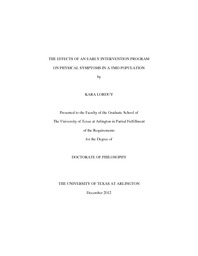
ATTENTION: The works hosted here are being migrated to a new repository that will consolidate resources, improve discoverability, and better show UTA's research impact on the global community. We will update authors as the migration progresses. Please see MavMatrix for more information.
Show simple item record
| dc.contributor.author | Lorduy, Kara | en_US |
| dc.date.accessioned | 2013-03-20T19:12:34Z | |
| dc.date.available | 2013-03-20T19:12:34Z | |
| dc.date.issued | 2013-03-20 | |
| dc.date.submitted | January 2012 | en_US |
| dc.identifier.other | DISS-12010 | en_US |
| dc.identifier.uri | http://hdl.handle.net/10106/11613 | |
| dc.description.abstract | Aims: 1) Identify comorbid, non-specific symptoms of CSS, and TMD specific symptoms across three groups of Axis I RDC/TMD disorders, 2) investigate the influence of three interventions on TMD specific and comorbid symptoms of CSS and pain and pain-related disability, and 3) examine the influence of emotional distress on symptoms, pain, and pain-related disability. Methods: Participants were patients recruited from dental clinics within a major metropolitan area assessed for TMD nonspecific symptoms of CSS using the Symptoms Checklist (Study 1) and TMD specific symptoms using the RDC/TMD (Study 2). In Study 2, participants at high-risk for chronicity were randomly assigned to a self-care (SC) or biobehavioral (BB) intervention and evaluated for their responsiveness immediately following treatment (T2). Results: In Study 1, we found that those with a TMD Muscle Disorder and those with more than one TMD diagnosis had more symptoms of CSS. As predicted in Study 2, symptoms for Axis I Group I Muscle Disorders and Axis I Group III Bone Deficiencies and several of the target variables therewithin were significantly reduced immediately following Treatment. Moreover, emotional distress accounted for a substantial amount of the variance for physical symptoms and mediated comorbid symptoms of CSS. Conclusions: Comorbid symptoms are strongly related to myofacial TMD. Axis I Group I and Group III disorders are more responsive to the effects of intervention immediately following treatment compared to Axis I Group II Disc Displacements. Key words: temporomandibular disorder (TMD), myofacial TMD, central sensitization syndrome (CSS), biobehavioral, emotional distress. | en_US |
| dc.description.sponsorship | Gatchel, Robert J. | en_US |
| dc.language.iso | en | en_US |
| dc.publisher | Psychology | en_US |
| dc.title | The Effects Of An Early Intervention Program On Physical Symptoms In A TMD Population | en_US |
| dc.type | Ph.D. | en_US |
| dc.contributor.committeeChair | Gatchel, Robert J. | en_US |
| dc.degree.department | Psychology | en_US |
| dc.degree.discipline | Psychology | en_US |
| dc.degree.grantor | University of Texas at Arlington | en_US |
| dc.degree.level | doctoral | en_US |
| dc.degree.name | Ph.D. | en_US |
Files in this item
- Name:
- Lorduy_uta_2502D_12010.pdf
- Size:
- 563.0Kb
- Format:
- PDF
This item appears in the following Collection(s)
Show simple item record


